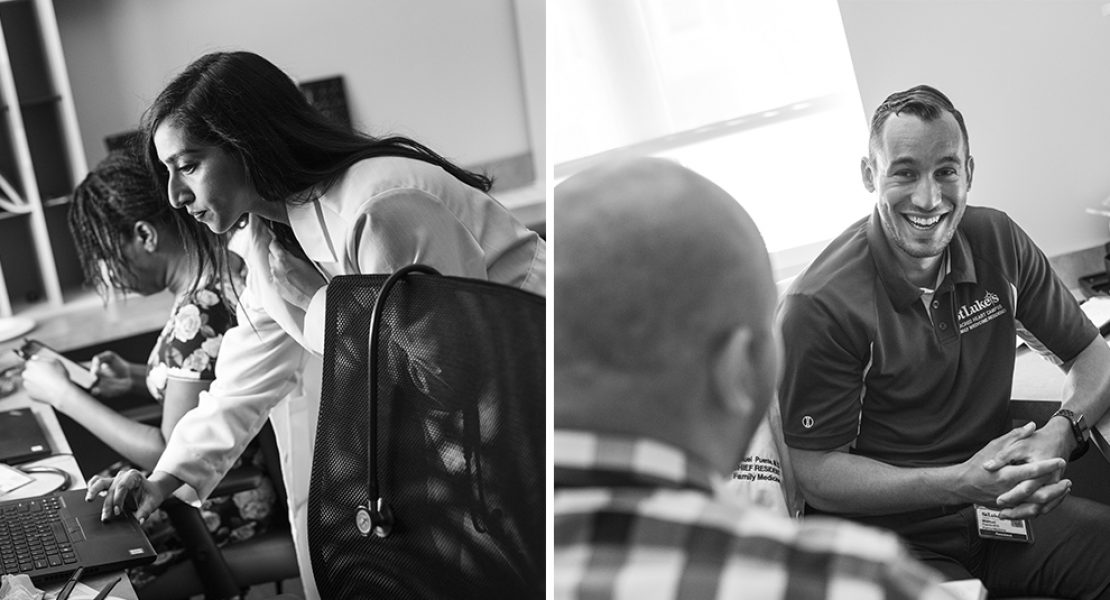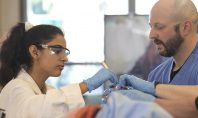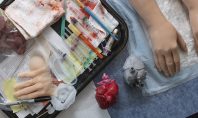Caring Around the Clock: A Day in the Life of a Med School Resident

After years of undergrad and medical school, doctors still have to undergo a grueling residency program before they can be full-fledged attending physicians. The schedules of first-year and third-year residents are incredibly different.
Geny Augustine, M.D. completed her first-year of residency—the intern year—this summer. Manuel Puente, M.D. graduated from St. Luke’s residency program this summer and is an assistant clinical professor of family medicine at its Sacred Heart Campus.
Join us as they provide a glimpse into their daily lives and make their way into the medical profession.
4:30 to 6:30 a.m.
Depending on what Augustine has on her plate, she’ll wake before sunrise to study for her exams—yes, residents have exams—and walk her dog.
“Whenever I have a spare moment, I pull out my phone to do [study] questions,” she says.
If Augustine is working a 12-hour shift, she’ll get to the hospital—either St. Luke’s Allentown Campus or the Sacred Heart Campus—around 6:30 a.m. For her twice-monthly 24-hour shift she’ll get to work at 7 a.m.
As a third-year resident, Puente was able to get eight hours of sleep every night, waking up at 6:30 a.m. before heading into his office.
7 a.m.
Augustine doesn’t usually eat breakfast at home. She packs berries, and her first stop is the cafeteria for a cup of coffee. “I used to brew my own, but I don’t have time anymore,” she says. Coffee in hand, Augustine and her morning-shift coworkers will catch up with the night team to prepare for the day’s work.
Her morning generally consists of visiting patients and writing up her notes. “Depending on how many patients I have, I’ll do this through noon,” she says, noting that routine work is (temporarily) abandoned if there is an emergency.
12 p.m.
Lunch for Augustine usually occurs anywhere from noon to 2 p.m. to 4 p.m.
“When we have a chance to eat then that’s when lunch happens,” she says. “I know I should break for a snack from time to time, but I never do.”
Puente has scheduled desk time from 11:30 a.m. to 1 p.m. to catch up on paperwork and eat lunch.
“If you get behind on miscellaneous tasks, it’ll bury you,” he says. “As a third-year, you’re always trying to find ways to maximize your time.”
4:30 p.m.
Puente will continue to see patients throughout the afternoon and pack up anywhere between 4:30 and 5 p.m. He heads to the gym for a workout and Brazilian Jiu-Jitsu four to five days a week from 6 to 8:30pm.
“It’s a pretty demanding sport, but I’m hooked on it,” says Puente, who only had time for Jiu-Jitsu—not any extra workouts—during his first-year residency.
6:30 p.m.
If Augustine is working a normal 12-hour shift, she heads home at 6:30 p.m. to finish her notes. Augustine will either go out to eat or make dinner with her husband, who works locally as a psychologist.
“Sometimes we get together with other resident friends and keep it an early night because we know the next day will be the same thing,” she says.
The rest of the evening is spent hitting the books.

7 p.m.
When Augustine has a 24-hour shift, she’ll try to eat dinner around 7 p.m.
“If I’m lucky, my husband will be available to bring me something to eat. If it’s calm, we share dinner together,” she says. “Being on-call in a hospital is unpredictable. It’s never the same,” she says. “Some nights I don’t get called, and I can get some rest. Others, I can’t close my eyes until 3 a.m. But you have to roll with it.”
9:30 p.m.
Puente has dinner late, around 9:30 p.m. after he comes home from the gym. He aims to get into bed by 10:30 or 11 p.m. after watching TV and spending quality time with his wife.
Midnight
During a 24-hour shift, Augustine might be able to lay down for a bit. “But because I’m the intern I have to answer all of the pages,” she says. “It’s the unspoken [rule].”
That said, both Augustine and Puente say being the intern to answer every page is the best way to learn and also a huge reason why the first-year residency is so challenging.
“When you’re a first-year resident you’re adjusting to the physical demands of the job,” Puente says.
“You’re running a mental marathon because you’re learning so much new stuff.”
The longest Augustine has ever slept during an overnight shift is five hours, but only two hours at once.
Days Off
Augustine will head home for her day off, but not to sleep. If she has time, sometimes she’ll treat herself to watching “She’s Gotta Have It” or the obligatory “Grey’s Anatomy.”
During longer breaks, Augustine and her husband will travel, often to Toronto where she’s from.
“Whenever we have free time we try to do something with it,” she says. “We all need fun breaks here and there.”
Both Puente and Augustine agree that although their residencies are very stressful and demanding, helping patients feel better and heal makes it all worthwhile.



















